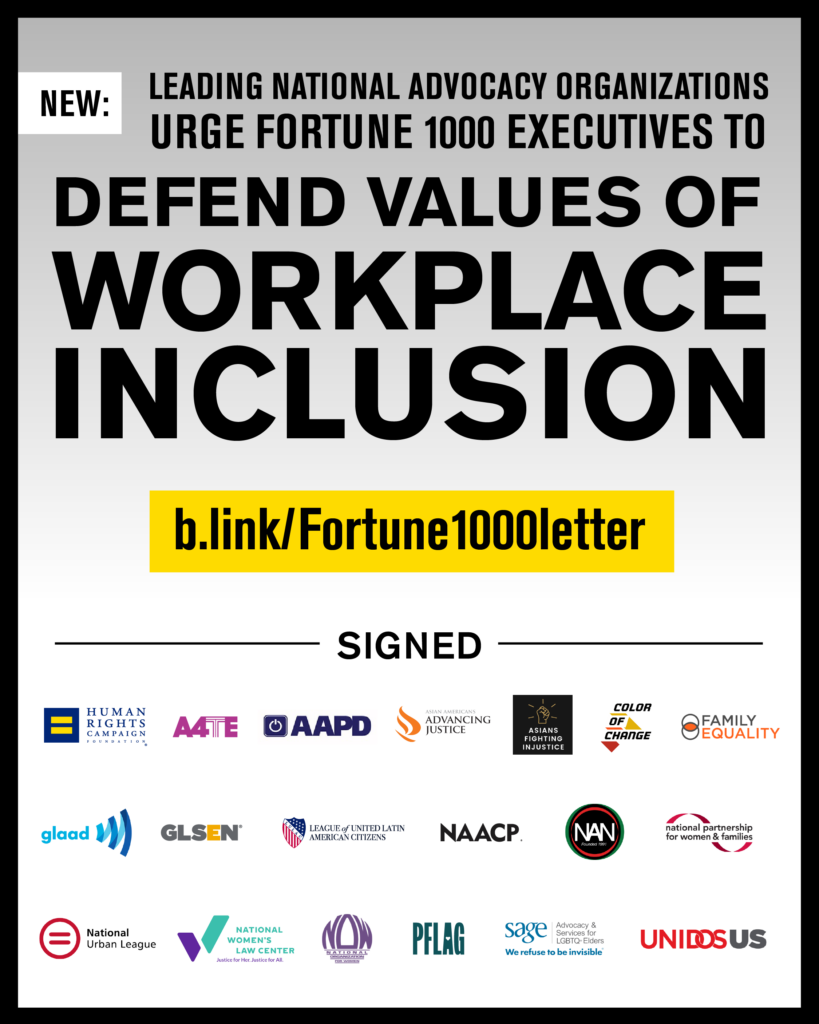Today, GLAAD and leading national civil rights organizations representing women, people of color, people with disabilities, and the LGBTQ community, issued a call to action to Fortune 1000 executives and board members to remain steadfast in their commitments to workplace inclusion and the inherent risks in abandoning decades-long best practices.
We are proud to join civil rights organizations across the country calling for Fortune 1000 executives and board members to remain steadfast in their commitments to workplace inclusion and the inherent risks in abandoning decades-long best practices. 🧵(1/5)
— Sarah Kate Ellis (@sarahkateellis) September 19, 2024
The letter makes the long recognized case that diversity, equity and inclusion best practices are not only essential for business success, they are needed to drive the future economy. The organizations write that with overwhelming public support, backing workplace inclusion efforts is not political. Instead, backtracking on inclusion commitments risks negative long-term business consequences. Business executives and board members must lead by rejecting pressure campaigns from a small but loud group of politically motivated bad actors seeking to undermine business success.
The letter reads in part:
“Abandoning DEI will have long-term consequences on business success — ultimately shirking fiduciary responsibility to employees, consumers, and shareholders. Businesses that fail to include women, people of color, people with disabilities, and LGBTQ+ people neglect their financial duty to recruit and retain top talent from across the full talent pool and limit their company’s performance overall.”
USA Today broke the story of the letter, calling attention to the fact that a number of Fortune 500 executives have been publicly reaffirming their commitment to DEI principles in the face of attacks from a small number of anti-LGBTQ extremists, including JPMorgan Chase CEO Jamie Dimon, who said: “It’s good for business. It’s morally right. We’re quite good at it. We’re successful.”
The data on diversity and inclusion is clear:
Washington Post Poll: 6 in 10 Americans support diversity and inclusion programs.
McKinsey: Companies in top quartile for gender and ethnic diversity significantly outperform their competitors.
According to new data from Edelman, 60% of people say an inclusive work culture with a well-supported diversity program is critical to attracting and retaining them as an employee. That’s up 9 points from 2022.
- Ipsos/GLAAD: Americans are nearly twice as likely to say they would want to back companies facing criticism for supporting people in the LGBTQ community, rather than their critics.
HRC: 80% of LGBTQ consumers are not only opting to boycott companies that are rolling back inclusion initiatives, but more than half will urge others to do so also, taking their concerns to social media or sharing negative company reviews. For employees at companies walking back their commitments to inclusion, nearly 20% of LGBTQ employees said that they would quit working for that company or start looking for a new job and one-third of LGBTQ employees said their productivity would suffer.
View this post on InstagramRead more about how LGBTQ inclusion and DEI is good for business at glaad.org/pridefacts.













